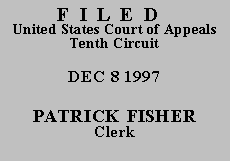

| DWIGHT BURNISON,
Plaintiff-Appellant,
v.
RICHARD MACIAS, County Judge;
GREGORY WALLER, District Judge;
CARMEN S. GREENUP, Assistant
County Counselor; Defendants-Appellees. |
No. 97-3214
(D.C. No. 97-1163-WEB) (Kansas) |
Dwight Alvin Burnison was convicted in state court for failure to obtain a required business license and fined $100.00. The Kansas Court of Appeals affirmed his conviction. Sedgwick County v. Burnison, No. 73,477 (Kan. Ct. App., May 31, 1996) (unpublished). Mr. Burnison subsequently filed the present action against the county court judge who found him guilty, the state distrcit court judge who found him guilty after a trial de novo, the members of the panel of the Kansas Court of Appeals who affirmed his conviction, the code enforcement officer who issued the initial citation, the prosecutor in charge of the case, two detention deputies employed by the Sedgwick County Sheriff, and the individual members of the Sedgwick County Board of County Commissioners, alleging various violations of his constitutional rights in connection with proceedings surrounding his failure to obtain a building contractor's license.
Each of the defendants filed motions to dismiss. Mr. Burnison did not respond to these motions, but rather filed his own motion for summary judgment. Treating Mr. Burnison's motion for summary judgment as a response to the defendants' motions to dismiss, the district court dismissed the complaint for failure to state a claim upon which relief could be granted under Fed. R. Civ. P. 12(b)(6). Mr. Burnison contends on appeal that the district court erroneously dismissed his claims, thereby depriving him of his Seventh Amendment right to a jury trial. We affirm.
"We review de novo a district court's dismissal of a cause of action for failure to state a claim upon which relief can be granted." See Chemical Weapons Working Group, Inc. V. United States Dep't of the Army, 111 F.3d 1485, 1490 (10th Cir. 1997).
We uphold a dismissal under Fed.R.Civ.P. 12(b)(6) only when it appears that the plaintiff can prove no set of facts in support of the claims that would entitle him to relief, accepting the well-pleaded allegations of the complaint as true and construing them in the light most favorable to the plaintiff.
Yoder v. Honeywell Inc., 104 F.3d 1215, 1224 (10th Cir. 1997) (quoting Fuller v. Norton, 86 F.3d 1016, 1020 (10th Cir. 1996)).
Mr. Burnison contends the district court improperly denied his motion for summary judgment without requiring a response from the defendants pursuant to Fed. R. Civ. P. 56. We disagree. Although the district court could have dismissed Mr. Burnison's complaint based on his failure to respond to the defendants' motions to dismiss, the court instead treated his motion for summary judgment as his response and dismissed the complaint on its merits. Because the complaint was dismissed prior to the date defendants' response to the motion for summary judgment was due, they had no obligation to file a response.
Moreover, each of the defendants named by Mr. Burnison is immune from suit. A judge is generally immune for actions "taken in the judge's official capacity." Mireles v. Waco, 502 U.S. 9, 11 (1991) (per curiam). The state judges who adjudicated Mr. Burnison's case clearly did so in their judicial capacities. Their immunity can therefore be overcome only if their actions, "though judicial in nature, [were] taken in the complete absence of all jurisdiction." Id. at 12. In this case, the judicial defendants acted under authority granted by the Kansas state legislature to enforce a municipal ordinance and were therefore entirely within their jurisdiction. Likewise, a prosecutor is entitled to absolute immunity from suit where, as here, "his activities are intimately associated with the judicial phase of a criminal process." DiCesare v. Stuart, 12 F.3d 973, 977 (10th Cir. 1993).
Finally, the remainder of the defendants, as executive officers, are entitled to qualified immunity unless Mr. Burnison shows that they violated a "clearly established" law or right. See Lenz v. Dewey, 64 F.3d 547, 550 (10th Cir. 1995). "The plaintiff must make a particularized showing, demonstrating that the contours of the violated right were so established that 'a reasonable official would understand that what he [wa]s doing violated that right,' or that the official did not act in good faith." Id. at 550-51 (quoting Anderson v. Creighton, 482 U.S. 635, 640 (1987)). Since defendant county officials acted pursuant to a municipal ordinance held to be valid by the Kansas Court of Appeals, there is no evidence that defendants violated any law, much less one they knew or should have known to be unconstitutional. Mr. Burnison did not meet his burden.
The AFFIRM the district court's grant of the motion to dismiss.
ENTERED FOR THE COURT
Stephanie K. Seymour
Chief Judge
*.This order and judgment is not binding precedent, except under the doctrines of law of the case, res judicata, or collateral estoppel. The court generally disfavors the citation of orders and judgments; nevertheless, an order and judgment may be cited under the terms and conditions of 10th Cir. R. 36.3.